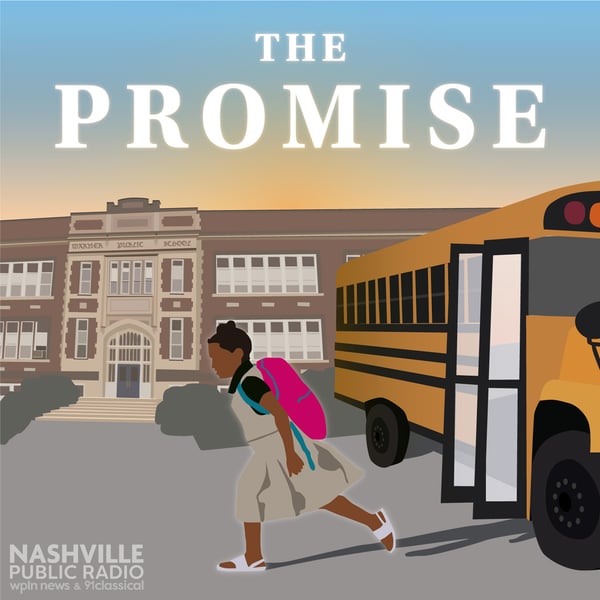What the Hell Are You People Doing? | The Kids of Rutherford County
The Promise
Nashville Public Radio
4.9 • 777 Ratings
🗓️ 9 November 2023
⏱️ 34 minutes
🧾️ Download transcript
Summary
A young lawyer named Wes Clark can’t get the Rutherford County juvenile court to let his clients out of detention—even when the law says they shouldn’t have been held in the first place.
He’s frustrated and demoralized, until he makes a friend.
Credits: “The Kids of Rutherford County” is a production of Serial, The New York Times, ProPublica and Nashville Public Radio. It was written and reported by Meribah Knight with additional reporting from Ken Armstrong at ProPublica.
The show was produced by Daniel Guillemette with additional production by Michelle Navarro. It was edited by Julie Snyder and Jen Guerra. Additional editing by Anita Badejo, Sarah Blustain, Tony Gonzalez, Ken Armstrong and Alex Kotlowitz. The Supervising Producer is Ndeye Thioubou; research and fact checking by Ben Phelan, with additional fact checking by Naomi Sharp. Music supervision, sound design, and mixing by Phoebe Wang. Our Standards Editor is Susan Wessling. Legal review from Dana Green and Al-Amyn Sumar.
Original score by The Blasting Company. Additional production from Jenelle Pifer. Mack Miller is the Executive Assistant for Serial. Art by Pablo Delcan. Sam Dolnick is a Deputy Managing Editor of The New York Times.
Transcript
Click on a timestamp to play from that location
| 0:00.0 | In 2013, three years before the arrest at Habgut Elementary, when a bunch of kids were arrested and brought to juvenile detention for not stopping a fight, a guy named Wes Clark had just graduated law school. |
| 0:13.8 | Wes was 25 years old, smart, ambitious, but he was also just coming out of a pretty wild past. |
| 0:20.7 | On and off, since he was a teenager, |
| 0:22.6 | he'd been addicted to Oxycontin. A hopeless love of this shit is how he puts it. |
| 0:28.2 | With that, came Wes's rap sheet, a DUI, some drug charges. So considering this, he knew the chances |
| 0:36.8 | of getting a job at a Tony Whitechew law firm were pretty close to zero. |
| 0:41.3 | But he needed a job. |
| 0:43.2 | That's when some lawyers he meant recovery circles gave him a tip. |
| 0:46.8 | There's always work in juvenile court. |
| 0:49.5 | They were like, hey, this is a place you can go and at least start out and learn the ropes because there was a need for lawyers to do that. |
| 0:59.2 | Court-appointed juvenile cases don't pay well, and lawyers have told me that juvenile court lacks the prestige of adult criminal court. |
| 1:07.4 | One lawyer harshly described it as the bottom rung of the legal practice. |
| 1:12.4 | But for Wes, you know, it was something to do, which was much better than nothing to do. |
| 1:18.2 | At the time, Wes was living in Rutherford County, Tennessee. |
| 1:21.8 | And so I just went down to the juvenile court and observed a couple of days and then asked to, you know, |
| 1:30.4 | be put on the list to take appointments. And it was in January of 2014 that I got my first |
| 1:38.5 | juvenile court appointment. Wes's first case was for a girl who was being held in detention on a misdemeanor called |
| 1:47.9 | reckless burning. The crime Wes had never heard of. The girl was accused of setting a small fire in a |
| 1:53.9 | neighbor's barn. So police had picked her up the day before and taken her to Juvee, where she spent the |
| 1:59.4 | night in a cell waiting for her hearing. |
| 2:01.8 | Wes went down to the detention center to meet with her. |
| 2:04.7 | I remember just, like, physically how small she was, like, kind of struck me. |
... |
Transcript will be available on the free plan in -507 days. Upgrade to see the full transcript now.
Disclaimer: The podcast and artwork embedded on this page are from Nashville Public Radio, and are the property of its owner and not affiliated with or endorsed by Tapesearch.
Generated transcripts are the property of Nashville Public Radio and are distributed freely under the Fair Use doctrine. Transcripts generated by Tapesearch are not guaranteed to be accurate.
Copyright © Tapesearch 2025.

